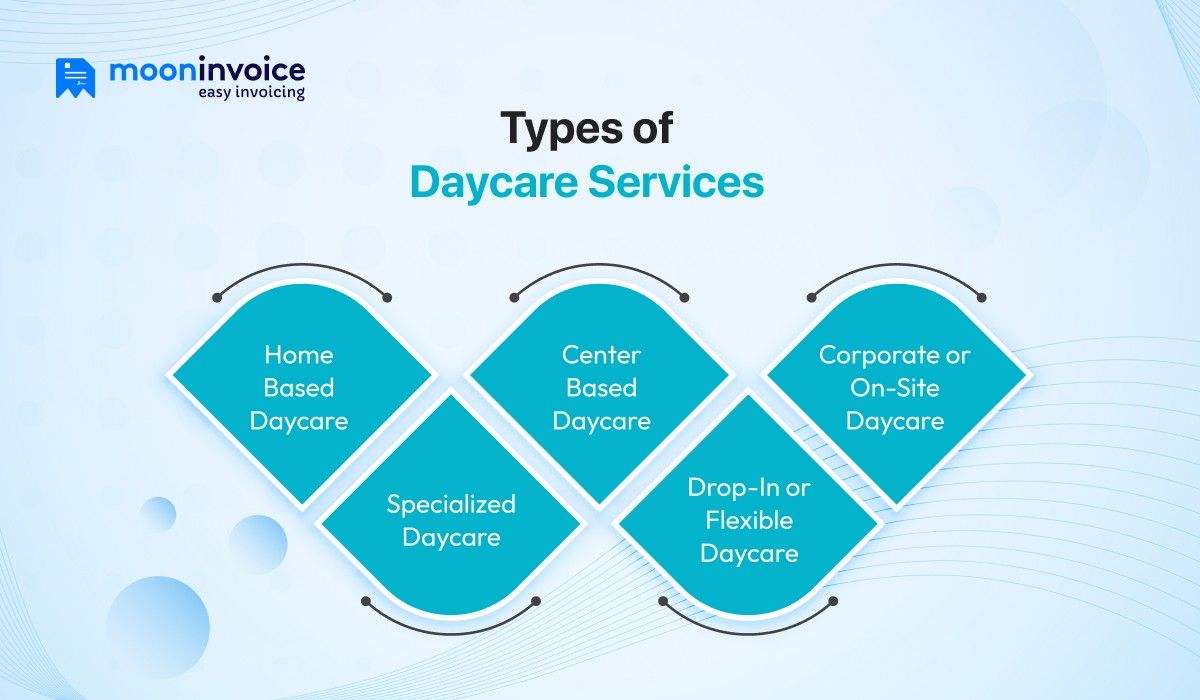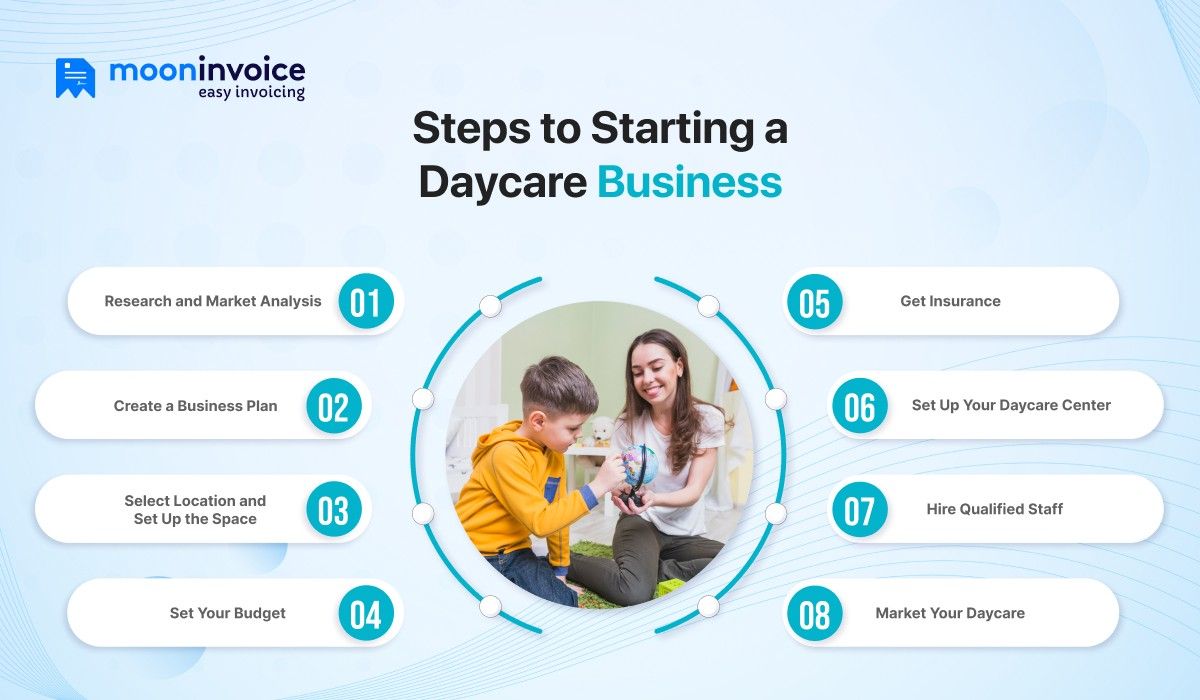A daycare business can be a profitable business strategy in the long run, considering the current parenthood scenario where both parents (husband & wife) are working professionals.
According to an article, nearly 23.4% of children under the age of five attend designated daycare centers. A place that is safe, comfortable, and accommodates children’s needs will always be most preferred for daycare.
Opportunities like these, along with the growing demand for daycare, indicate that a daycare business has the potential to be successful in the coming days.
So, if you are still wondering how to get started with a daycare business, this blog will solve all your queries.
Let’s jump straight in…
📌 Key Takeaways
- A daycare business involves caring for children from infancy to school-going age, prioritizing each child’s nutrition and growth.
- There are five major types of daycare business: home-based, center-based, corporate or on-site, specialized, and drop-in flexible daycare.
- Starting a daycare center requires thorough research, developing a business plan, and selecting an ideal location.
- Budget planning, insurance, hiring staff, and marketing are essential steps in starting a daycare business.
- Using invoicing software can help keep daycare finances clean and error-free.
What is a Daycare Business?
A daycare business is a service-based venture that offers services like professional care, supervision, and early education to children. From infancy to the school-going age, the daycare business takes care of everything.
The objective of a daycare business is to provide a safe, healthy, and nurturing environment where children can play, learn, and grow while their parents are at work.
This may sound like babysitting, but it is not. A daycare is a well-planned business that comes with policies, licensing, and trained professionals to ensure the child is in good hands. Some daycare centers offer early childhood education programs to help each child develop cognitive skills.
Types of Daycare Services
The daycare industry isn’t about one type of service. Different families have different needs, and based on that, services are chosen.
Here are the 5 major types of daycare services:
1. Home-Based Daycare
This is a type of daycare service that runs from a residential property. These often come under small-scale daycare services.
- Pros: Low startup costs, flexible hours
- Cons: Limited number of children, zoning restrictions in some areas
2. Center-Based Daycare
This is a professional daycare service type. Here, a large number of children are accommodated without any hassle.
- Pros: Higher capacity, better learning resources
- Cons: Higher operating costs, strict licensing
3. Corporate or On-Site Daycare
These types of daycare services are located near office buildings or workplaces to benefit parents.
- Pros: Guaranteed client base, long-term contract with companies
- Cons: Requires partnerships with businesses, or else profit margin declines
4. Specialized Daycare
As the name suggests, it is designed for children with specific needs such as disabilities, language immersion programs, etc.
- Pros: Less competition, premium prices due to special care
- Cons: Highly sensitive and trained staff are required
5. Drop-In or Flexible Daycare
No long-term contracts are needed in this type of daycare. It offers short-term childcare.
- Pros: Checks with parents even without any schedule (better for the child)
- Cons: Income is not predictable
To select the right daycare model for your business, you need to evaluate your budget, available space, target audience, and personal expertise. You can combine two or more models to solidify your reach.
From Parent Fees to Staff Expenses – Handle All Daycare Finances in One App!
Select Moon Invoice, invoicing software that is capable of handling all of your finances, such as invoicing, expenses, estimates, purchase orders, etc, and helps you stay ahead of your business finance.
Steps to Starting a Daycare Business
If you are wondering how to start a daycare business, the following steps will help you.
1. Research and Market Analysis
Validate if there’s enough demand and affordability for daycare services in your locality. After the validation is complete, you can choose a daycare model (home-based, center-based, or any other type) based on the demand.
Find out the following:
- Demand: How many families need care? Compare full-time vs part-time.
- Ability to pay: Explore the local price range of a daycare facility.
- Competition: Who’s serving whom, with what standard of living, and reputation?
- Location viability: Catchment area, commute routes, etc.
How to Research?
The research of your child care business should be done in two ways. One is desk research, and the other is field research. In desk research, you will consider factors such as demographics, employment patterns, operating hours, indoor-outdoor requirements, food/health rules, staff credentials, etc.
In field research, you will do parent interviews, competitor visits, and location walk-throughs to have clarity on the budget and ensure smooth business operations.
Do Parent Survey
- Child’s age(s) & preferred start date
- Care need: full-time/part-time/drop-in
- Hours needed (e.g., 8-6)
- Top priorities (hygiene, safety, curriculum)
- Monthly budget range
- Food allergies/medical needs
- Interest in: weekend care/holiday camps/transport
2. Create a Business Plan
A business of any kind, if there is no planning, it won’t last long, and the same is the case with the daycare business. A strategically solid business plan highlights how your business will operate, gain new clients, and stay profitable.
Here, you need to define your target audience and the services you want to offer to your clients. Later pricing is structured based on your earlier market research, target audience, and services offered.
Once the target audience and pricing part is complete, next you need to address other critical factors such as marketing strategy, financial planning, and operations plan.
Here’s what you need to do:
- Marketing strategy: Create a roadmap to promote on social media, local partnerships, and community events.
- Operations plan: Prepare a detailed list of staff roles, daily schedules, safety policies, and curriculum approach.
Later, once the daycare business plan is ready, you can think of selecting a location and setting up the daycare space.
3. Select Location and Set Up the Space
After creating your business plan, the next step is to select a good location to succeed in the childcare business. High-demand areas such as schools, workplaces, and residential neighborhoods are great for getting started.
Also, you need to check if there is parking availability and visibility for easy drop-offs and pick-ups.
Once the location part is over, you need to design a child-friendly environment.
How to do it? Let’s understand.
- Your child care center must meet daycare licensing requirements for indoor and outdoor space per child.
- Safety is undeniable. Your space should have childproof locks, cushioned flooring, and secure gates.
- There should be dedicated areas for learning, play, meals, and rest to ensure smooth management of operations.
Lastly, don’t forget that the location you choose should be safe, easily accessible, and must comply with local zoning laws.
4. Set Your Budget
Budget planning is one of the most important aspects of any business, and for a daycare business, it is even more important as it requires attention to detail. List out the costs involved in business registration, licensing, deposits for rent or mortgage, redesigning the child-proofing space, and purchasing safety equipment, toys, etc.
To operate your daycare business seamlessly, investing in tools like project management, billing, or invoicing software can relieve your workload. Investing in these tools is essential as they come with key features that help you focus on other aspects of your business.
For example, invoicing software will help you choose from pre-made daycare invoice templates, create and send invoices, track them, and collect payments through multiple methods, which ultimately saves time and improves productivity.
Maximize Efficiency of Your Daycare Business by 10X
Create invoices, track payments, and manage expenses seamlessly with Moon Invoice.
5. Get Insurance
Getting your daycare business insured is non-negotiable. It protects the business operations and the children in your care. Accidents and emergencies can’t be predicted, and this is why having coverage is a must.
Do some research on insurance policies specifically designed for childcare businesses. Here are a few types of insurance you can consider.
- General Liability Insurance: It covers accidents, injuries, or property damage.
- Professional Liability Insurance: Claims of negligence or mistakes in childcare are protected.
- Workers’ Compensation: If you have employees, it is required. It covers staff injuries or illness.
- Property Insurance: Protects your building, furniture, and equipment.
Based on the size of your daycare business and the services you offer, you should select a business insurance policy.
6. Set Up Your Daycare Center
The answer to “how to open a daycare center” stays in how well you plan and set up your daycare business. Once your business plan, budget, and insurance are ready, you can prepare your daycare centre to onboard new clients.
Your daycare centre should follow local regulations with a nurturing and engaging environment. Whether you’re running a child care facility or operating from family child care homes, the setup should be child-friendly.
Create different zones, such as play areas, learning corners, dining sections, and nap spaces. Safety needs to be the top priority here.
New child care providers should invest in age-appropriate books, art, drawings, toys, and outdoor play equipment. Your daycare centre should be bright and colourful. Walls should be filled with paintings and cartoon characters that appeal to every child.
7. Hire Qualified Staff
Staff of your daycare business should be qualified and professional. The success rate of your childcare business depends on how your team takes care of the kids. Parents want assurance that their children will be in good hands and are cared for by trustworthy professionals.
When you hire staff, verify that the candidate has a background in childhood education, first aid certification, or prior experience working with children.
You must maintain a child-to-staff ratio to ensure safety and compliance. For small daycare setups, like in-home daycare, staff can be limited, but versatility matters more. Training and in-person orientation are key to understanding daily routines and communication practices.
8. Market Your Daycare
As a business owner, marketing is essential to stay competitive in the childcare industry. After the licensing process and daycare business setup are done, your primary goal should be how to market your business.
Currently, online presence, like creating a website or interacting with users on social media, is the best option. It has the potential to attract families looking for trusted childcare options.
Connecting with local businesses and family services organizations could also bring new clients, which would strengthen your business. Market not just to gain clients, but also to promote the goal and vision to build a reputation.
A combination of community outreach, digital promotion, and quality services will keep your daycare business going.
How Much Does It Cost To Open a Daycare Business?
The cost of a daycare business starts from $10,000 to $50,000 (the most advanced). The services you plan to offer determine the cost of your daycare business. For example, if your goal is to start a daycare business temporarily, you can start with Drop-in Daycare or Home-based Daycare. These two options are short-term and come with low startup costs.
If your goal is to start a full-fledged daycare business with every detail and premium offerings, the cost of your daycare business will be higher. Here, you will have to consider quality services, designing the daycare center, hiring qualified professionals, etc.
Benefits of Opening a Daycare Center
A daycare business is profitable if you follow the right metrics and know how to manage your daycare center. Here are some benefits of opening a daycare business:
- Growing Demand: The number of working parents is growing day by day, and this is why the childcare business continues to grow.
- Reduced Taxable Income: A childcare business helps you claim tax deductions on certain expenditures, which reduces the overall taxable income.
- Flexible Business Model: You can choose from home-based, center-based, specialized, corporate, or drop-in depending on your budget and goal.
- Community Impact: Daycare is a valuable service that supports families and helps early childhood development. Due to this, your brand grows over time.
Conclusion
Starting any kind of business has its ups and downs. When it comes to the daycare business, you need to be extra focused on the quality of service you provide, demand & affordability of the location, and the staff you hire.
Apart from these, finances are also important. You need to create invoices, make payments, receive materials from vendors, manage expenses, etc. Now, all of these can be managed seamlessly if you use Moon Invoice in your daycare business. It reduces administrative burden and helps you stay ahead of your finances.
Spare a moment and explore the features of Moon Invoice now!





















